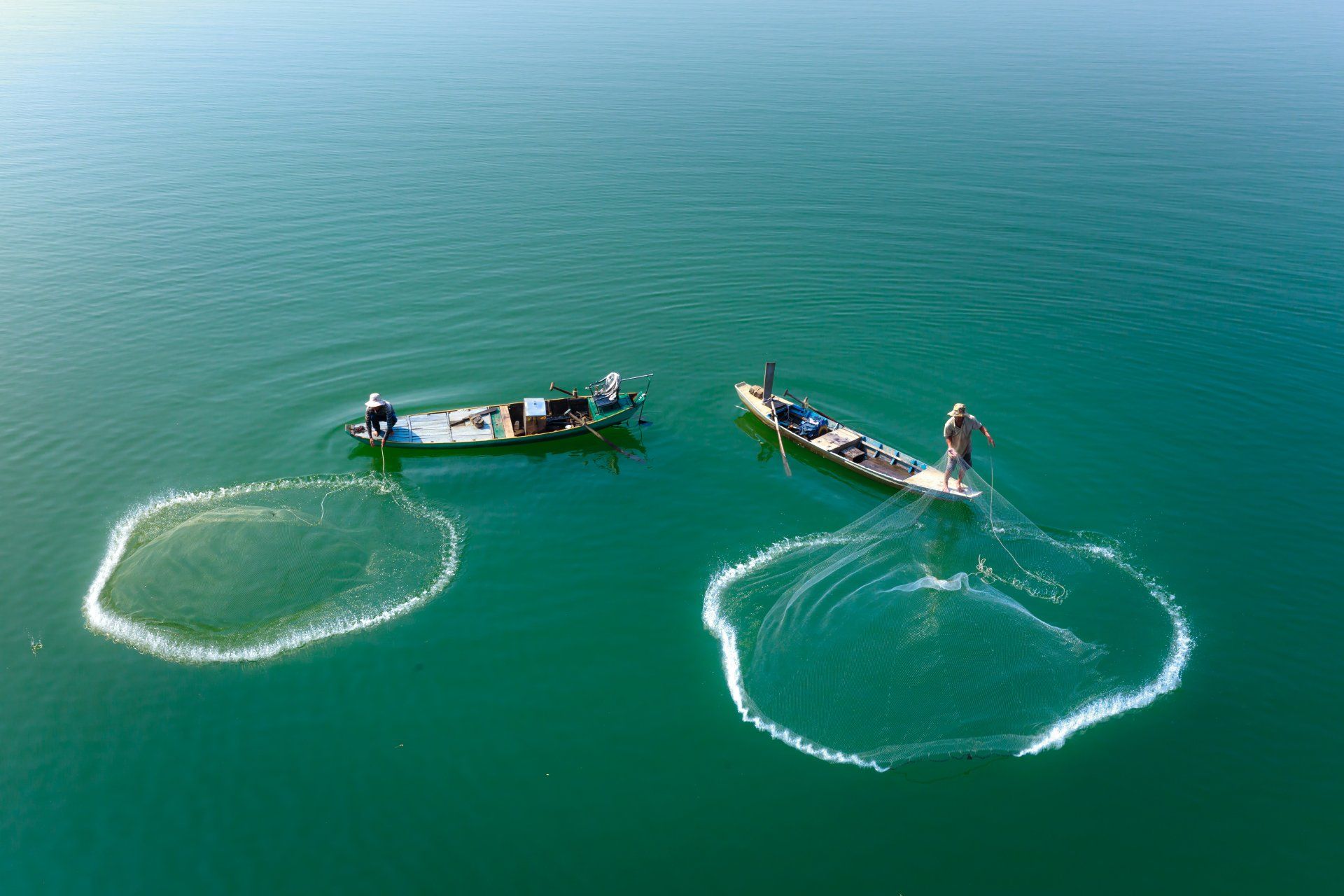2023 TOP 10 BLOG
VJEL Staff Editor: Jennifer Bass
Faculty Member: Professor Yanmei Lin
Money Subsidizing the Destruction of the Ocean Could Be Used to Save It.
The collapse of the ocean’s ecosystems could occur in the next 25 years if overfishing continues. One of the main consequences of overfishing is the loss of biodiversity in the ocean. One of the causes of biodiversity loss is overfishing by the global industrial fishing industry. Some of the practices that contribute to the loss of biodiversity are the overfishing of stocks of fish, unreported fishing, and the harmful government-paid fisheries subsidies that incentivize overcapacity and overfishing. The high seas are currently not covered under the international ocean treaties, causing countries to freely overfish the ocean in these areas. China is one of the worst offenders blamed by international community—the scope of the problem caused an international outcry, including from the United States. In order to stop overfishing of the high seas, the World Trade Organization has reached an international agreement that would end these practices. To protect the global environment, both the United States and China need to ratify global treaties, and take meaningful action to prohibit subsidies targeting overfished stocks and fishing on the high seas, and spend money to “rebuild the stock to a biologically sustainable level.”
Problems with Overfishing
Overfishing is not just a problem for the fish population but for every living creature on earth. “Biodiversity loss is tightly linked to declining water quality, harmful algal blooms, ocean dead zones, fish kills, and coastal flooding.” Given that one-in-five people in the world turn to the ocean as their main source of protein, overfishing could be catastrophic for populations across the planet. 50%-80% of the world’s oxygen comes from the Ocean, and the wildlife there are the largest carbon sink in the world. Depleting all life in the ocean could have an exponential effect intensifying global warming. Thirty percent of the ocean’s ecosystems have already collapsed globally, and the rest are not far behind. Unsurprisingly, the countries that are contributing the least harm will suffer the highest consequences from this loss of life. These countries often rely primarily on local sustainable fishing. The stock of wildlife taken on the open sea and the destruction done in the process, such as the effects of bottom trawling, affect ocean wildlife everywhere.
The solution is to stop governments from paying for overfishing on the high seas. “Fishing at the current scale is enabled by large government subsidies, without which as much as 54% of the present high-seas fishing grounds would be unprofitable at current fishing rates. . . . Deep-sea bottom trawling often produces net economic benefits only thanks to subsidies, and much fishing by the world’s largest fishing fleets would largely be unprofitable without subsidies and low labor costs.” The subsidization of these fleets upset the natural economics of fishing. Meaning that if these fleets were not subsidized over half of them would have never left the harbor and they would not be overfishing.
World Trade Organization Fishing Subsidies Agreement
The World Trade Organization has been negotiating for more than two decades to end fishing subsidies to fight the exploitation of the high seas. Though an agreement on Fishing Subsidies was finally reached on June 17, 2022, the agreement will not be implemented unless two thirds of the 164 member states ratify it. This might require approval action by congress, depending on if the agreement bans subsidies for vessels that engage in illegal, unregulated, and unreported (IUU) fishing practices prohibits subsidies for the fishing of overfished stocks but allows subsidies that are implemented to restore the fisheries. The agreement will also address the overfishing of the high seas and puts curb on subsidies for fishing on high seas if operations outside the jurisdiction of regional fisheries management organization (RFMO). The agreement attaches a great importance to transparency by making it mandatory for governments to disclose the fisheries subsidies, and provide annual lists of vessels and operations identified as engaging in IUU fishing.
Some of the provisions that were cut were “the agreement does not include a single reference to ‘capacity enhancing’ or ‘harmful subsidies’—the largest ones that lead to exploitation. [The agreement] does not ban any public money from governments going towards subsidizing capital costs.” These outstanding issues of the agreement will likely to be in the next round of negotiation during the next ministerial conference that to be held in 2023.
China’s overfishing and its role to stop it
China’s distant-water fishing fleets are currently engaging in overfishing the open sea at an unprecedented rate. The invention of refrigerated mother ships that can hold up to 500,000 cubic feet of cargo, or thousands of tons of fish, allow boats to extend their voyage. And Motherships are technically fishing legally under the international Law of the Sea Treaty. Every country has exclusive economic rights up to 200 nautical miles around the country’s coasts—beyond this is called the high seas. The high seas have equal economic zones for all countries. New satellite data found that “The ships hugged the so tightly that satellite mapping of their
positions traced the zone’s boundary.” Many of these zones are important to migratory species that enter in and out of them. The depletion of these fish could devastate local fisheries even if they are taking care of their own fisheries.
China’s ships account for some of the least profitable on the ocean. “The most unprofitable of all Chinese fisheries was bottom trawling in the Southwest Atlantic, which exhibited an average net loss (even after subsidies are taken into account) of $98 million.” When deep-sea bottom trawling produces net economic benefits it is often only thanks to subsidies. Many fishing operations by the world’s largest fishing fleets would be unprofitable without subsidies and low labor costs.” The subsidization of these fleets upset the natural economics of fishing.
In May 2022, China finally ended its 15 years of infamous fishing fuel subsidies and replaced with fishery stewardship subsidies, which is said to “be pivotal to the success of WTO negotiations on fisheries subsidies“. China also aims to reduce its total output from distant water fishing and control the size and number of the distant water fishing fleet according to its 14th Five-Year-Plan (2020-2025). However, more actions can be taken by Chinese government to stop overfishing that prevent the total collapse of the ocean ecosystem, which includes removing excess distant water fishing capacity, help fishers transition to alternative work, and establish funding to help restore fishery resources.
United States Response
The information of China’s role in the exploitation of global fisheries has sent an alarm to the United States, who see overfishing as a threat conserve marine resources globally and maintain national security. In response to this threat, President Biden signed the National Security Memorandum to Combat Illegal, Unreported, and Unregulated Fishing and Associated Labor Abuses. The United States also “pledged $60 million a year for the next decade.” Though this may seem like a great step in the right direction it could also be seen as a little hypocritical. That is because the second largest individual country to subsidize overfishing is the United States. The USA spends $3.4 Billion a year in subsidizing overfishing. The United States has not ratified the agreement that stop harmful fishing subsidies meaning they will continue to financially support the overfishing of the ocean by billions of dollars.
There is a growing international frustration with the United States refusal to sign and then ratify international treaties. Their track record is even more inadequate when it comes to signing international environmental treaties. China published a report on how the United States actions are damaging the international community ecologically. Some of the allegations include impeding the worlds’ ability to tackle climate change, not paying the countries fair share of contribution to international organizations, and disrupting the signing and implementation of international agreements. Further the agreements that the United States sign are often not ratified rendering them “outside of the multilateral framework.”
What the United States could be subsidizing is the restoration of the ocean and the creation of ocean sanctuaries. The United Nations has tried to pass the Global Ocean Protection Treaty five times and it once again failed in August of 2022. The negotiation would have made 30% of the ocean marine protected areas. The treaty would have also improved impact assessment, provide finance to developing countries, and would have proposed the sharing of resources. The money that is being put into subsidizing the overfishing of the ocean could be used to protect and restore it.
Conclusion
The United States pledged millions of dollars to stop the overfishing of the unregulated high seas. At the same time, the U.S. has not signed any of the recent international treaties to protect the ocean. This includes not signing the WTO’s agreement or stopping the subsidizing of overfishing by billions of dollars. Signing and ratifying the WTO’s agreement and supporting the adoption of the Global Ocean Protection Treaty could save the ocean from total collapse. The money spent on subsidizing overfishing could be put toward the conservation of the ocean. The United States should be a global leader for saving the environment instead of impeding its progress.


